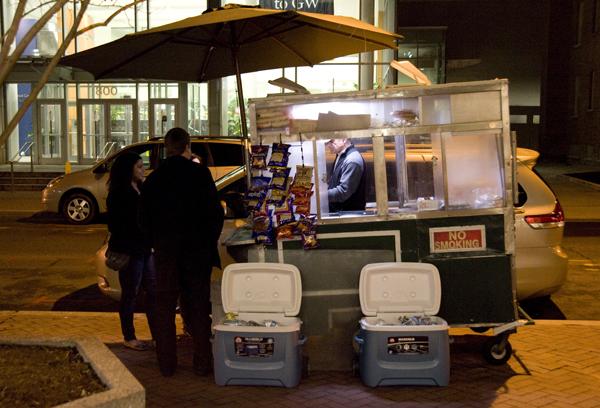It’s been nearly five months since the famed campus hot dog vendor known as “Manouch” parked his metal cart on 21st Street.
Manouchehr Mokhtarinava, who became a part of GW lore as he sold late-night soft pretzels and hot dogs to students for 28 years, said his business was ruined by allegations that he forcibly kissed and hugged a 19-year-old woman last April.
“That made me lose my job, and I’m going to lose my work and I’m going to lose my life,” Mokhtarinava said in an interview outside his Arlington home on Sunday.
He said he didn’t know “anything about the future,” though he wrote to a student in an email obtained by The Hatchet that he had given up his working license last May.
Metropolitan Police spokesman Paul Metcalf said investigation details would not be made public. An April crime report labeled the accusation as sexual abuse.
Mokhtarinava said Sunday he had talked to the girl twice before they kissed that night.
“It was supposed to be a kiss, I thought, like a goodbye, or something to that effect,” Mokhtarinava said. “It had the effect like wine and beer on me, the kiss itself. It off-tracked my mind and I just [kept] talking [to] people that night. And so maybe I talked a little bit loose, she didn’t like it, I don’t know what it was. God bless her heart.”
He made his last trip to campus May 20, a few weeks after the woman filed the report, because he said he wanted to sell the rest of his food supplies, he wrote in an email to a student.
A University Police Department officer who is familiar with the case said online comments and conversations around campus downplayed the seriousness of the accusation. The officer said the reaction turned into “victim-blaming.”
“What actually happened was very serious, very intense and very disruptive to her, and she was really upset about it,” said the officer, who spoke on the condition of anonymity because officers are not permitted to speak to the media.
Mokhtarinava said the charges also prompted University police to report him to the Metropolitan Police Department for working late into the night, after legal hours.
UPD Chief Kevin Hay said he “had no direct information on why Manouch isn’t around,” and added that officers did not bar him from campus.
“All I can tell you is that one of my officers told me that he was operating later than his permit really allowed him to,” Hay said.
Shaping a household name
Mokhtarinava’s time at GW spanned three University presidents’ tenures, the construction of the School of Media and Public Affairs building down the block and the replacement of Tower Records with CVS.
The Iranian immigrant, who came to the U.S. in 1977 to study at Norfolk State University, paid about $800 to launch his business in July 1985. Most of the money went toward licensing fees and the rest for one month’s cart rent.
For the first week, Mokhtarinava slept beside his cart in a park because he didn’t have a car to tow it to his home to Bethesda, he previously told The Hatchet. A few weeks later, he purchased the cart and moved to the corner of 21st Street and Pennsylvania Avenue.
“It was difficult at first. Here I was with a college background and I had to put myself down to serving hot dogs,” Mokhtarinava told The Hatchet in 1997. “But I was following my instincts, you see, and I was too independent to work for someone. I had plans for the future to own a business where people would work for me, and I would do nothing but read books for knowledge.”
For years, Mokhtarinava opened his stand Thursday through Saturday nights from about 9 p.m. to 4 a.m., though D.C. law restricts hours of operation for mobile cart vendors to 1 a.m. on Friday and Saturday nights.
He once told The Hatchet he had paid thousands of dollars in fines for working past legal hours. Mokhtarinava said in 2003 that he brought a 1,000-signature petition supporting his late-night business to D.C. Council member Jack Evans, but didn’t receive a response.
Throughout the 28 years, Mokhtarinava said GW students became the bright spot in his life.
“I am a lonely guy. We all are, in a sense. Then I found these people. They filled the spot,” Mokhtarinava said Sunday.
One night, he said University President Steven Knapp and his wife, Diane, stopped by. He said he has broken up fights, helped talk a student out of suicide and once even took a punch from a student.
“I have saved many lives,” he said. “I was happy that I had the best people in the world. It was my world.”
Allan Johnson lived in Lafayette Hall as a freshman in 2005, and would often cross the street with his friends to talk to Manouch.
“He’d take forever to make the hot dogs, but people would wait” even when temperatures dropped, Johnson said. “He dispensed all kinds of crazy advice and stories. I don’t know what you could even believe.”
– Aaron Goodtree contributed to this report
This post was updated Oct. 7, 2013 to reflect the following:
Correction appended
The Hatchet incorrectly reported that Mokhtarinava said that Steven and Diane Knapp once bought hot dogs from him. He actually said they stopped by his cart. They did not buy food.








